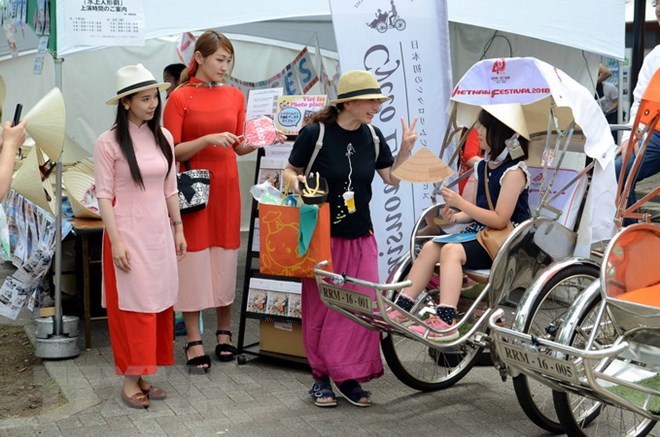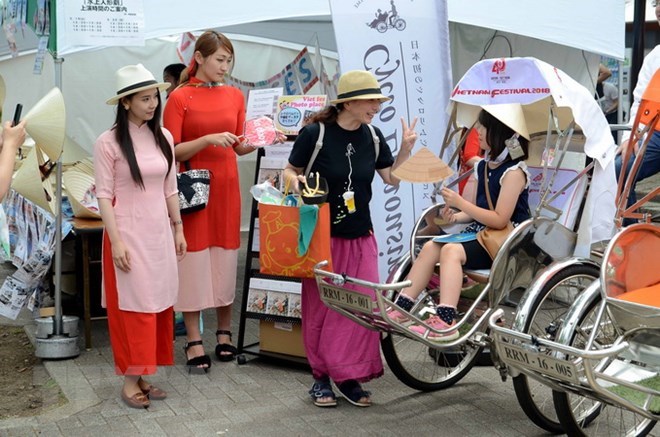
The Vietnam Festival 2018 kicked off at Yoyogi park in the Japanese capital of Tokyo on May 19 on the occasion of the 128th birth anniversary of late President Ho Chi Minh.

Visitors pose with
Vietnam's three-wheel cyclos
(Source: VNA)
Speaking at the opening
ceremony, Vietnamese Ambassador to Japan Nguyen Quoc Cuong said that the event
is part of important activities to take place in
Japan in 2018 in celebration of the
45th anniversary of bilateral diplomatic ties.
Besides
Tokyo, the Vietnam Festival will be
organised in other localities across
Japan,
including
Fukuoka, Aichi,
Osaka, Kanagawa, and Saitama, within this
year, Cuong added.
Former Japanese Prime Minister Yasuo Fukuda expressed his delight at the
development of the two countries’ relations, while hoping that the friendship
will be strengthened to meet aspirations.
Deputy head of the Japan-Vietnam Friendship Association Motoyoshi Ryoikichi
told the Vietnam News Agency that the bilateral ties are in a flourishing
period.
There are around 240,000 Vietnamese people living in
Japan, a tenfold increase compared
with the figure five years ago.
The
Vietnam festival was
first held in
Japan in
September 2008, becoming the biggest-ever festival of
Vietnam held in
the country, attracting 150,000 visitors in just three days.
Since then, the festival has been organised annually and become the largest
cultural exchange event between the two countries.
This year’s event has 120 pavilions, including 60 cuisine ones, and 50 others
introducing the image of Vietnamese land and people and Vietnamese goods, along
with art performances.
The two-day festival is expected to attract over 150,000 visitors.
Source: VNA
With an increasingly vibrant and widespread emulation movement aimed at building cultured residential areas and cultured families, Yen Thuy District has been making steady progress toward improving both the material and spiritual well-being of its people, while fostering a civilized, prosperous, beautiful, and progressive community.
Once lacking recreational spaces and community facilities, Residential Group 2 in Quynh Lam Ward (Hoa Binh City) has recently received attention for the construction of a new, spacious, and fully equipped cultural house. The project followed the model of state support combined with public contributions in both labor and funding.
The "All people unite to build cultural life" movement, which has been effectively integrated with Kim Boi district’s socio-economic development goals, is fostering a lively spirit of emulation across local residential areas, hamlets, villages, public agencies, and enterprises. In addition, through the initiative, traditional cultural values are being preserved and promoted, while community solidarity and mutual support in poverty reduction and economic development are being strengthened.
A working delegation of the Hoa Binh provincial People’s Committee led by its Permanent Vice Chairman Nguyen Van Toan on June 11 inspected the progress of a project to build the Mo Muong Cultural Heritage Conservation Space linked to tourism services in Hop Phong commune, Cao Phong district.
Born and growing in the heroic land of Muong Dong, Dinh Thi Kieu Dung, a resident in Bo town of Kim Boi district, in her childhood was nurtured by the sweet lullabies of her grandmother and mother. These melodies deeply imprinted on her soul, becoming an inseparable part of her love for her ethnic group's culture. For over 20 years, this love for her hometown has driven Dung to research, collect, and pass down the cultural values of the Muong people to future generations.
In the final days of May, the Ethnic Art Troupe of Hoa Binh Province organized performances to serve the people in remote, mountainous, and particularly disadvantaged areas within the province. These were not just ordinary artistic shows, but they were the meaningful journeys aimed at spreading cultural values, enhancing the spiritual life of the people and contributing to the preservation of ethnic minority cultural identities.



